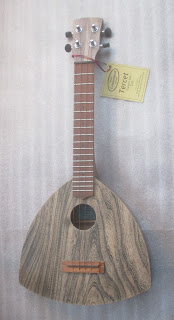What does a ukulele look like? Like a miniature guitar, right? Not necessarily.
Ukulele Manifesto
While most ukuleles look like mini guitars, other popular forms have emerged--the Bell, the Pineapple, the Fluke. The variety may be due to the uke's reputation as a whimsical, "fun" instrument, inspiring non-conformity in design; and the uke's small size makes design experiments cheaper and easier.
For someone like me who likes to design and make things of wood, and who also likes ukulele music, the uke's design possibilities have proven irresistible. I have not been immune to the whimsy factor either. The results, you see here on this blog.
I make ukuleles at 2nd Chance Wood Co. in Durand, MI (https://www.facebook.com/pg/2ndchancewood/posts/?ref=page_internal) . The ukes are made entirely of recycled wood from old Michigan barns and urban reclaimed wood. The instruments are for sale at the 2nd Chance store in Durand, MI. Individuals or dealers may also contact me at raberdavid@yahoo.com.


No comments:
Post a Comment